一霊四魂とは
一霊四魂について
一霊四魂とは?聞きなれない方も多いと思います。7つの章で詳しくご紹介いたします。
1)一霊四魂とは ~その起源
2)日本古来の叡智は精神の構造をどう捉えていたか
3)最先端の心理学と一霊四魂
4)一霊四魂と古今の人間観・世界観
5)一霊四魂を詳しくみて見ると
6)直霊は実際にはどのようにはたらくのか
7)四魂は磨かれ全徳を目指す
About "one spirit with four souls" 「OSFS」
What is “one spirit with four souls”? I think that there are also many people who cannot hear it. We will introduce them in detail in 7 chapters.
1) “One spirit with four souls” – its origin
2) How old Japanese wisdom perceived the mental structure
3) State-of-the-art personality theory and “one spirit with four souls”
4) “One spirit with four souls” and an ancient human view and world view
5) Looking closely at “one spirit with four souls”
6) How does one spirit called “Naohi” actually work?
7) Four souls are polished and aim for total virtue
一霊四魂とは 〜その起源
一霊四魂のそれぞれの要素は、神様の名前として、すでに日本書記(720年)に出てきます。四種の魂、荒魂(あらみたま)、和魂(にぎみたま)、幸魂(さちみたま)、奇魂(くしみたま)の四つの要素です。
因幡の白兎の伝説などで知られる大国主命(おおくにぬしのみこと;別名 大物主命 おおものぬしのみこと)は天帝から、少彦名命(すくなひこなのみこと)の二人で、地上建設を命ぜられます。
二人は絶妙のコンビで仕事にまい進しますが、相棒の少彦名命は「黄泉(よみ)の国」に行ってしまいます。つまり、死んでしまったのです。相棒を失った大国主命(大物主命)は、落胆し、海に向かって「おれはこれからどうやって地上建設をやっていったらいいんだー」と叫びます。
すると、水平線のかなたから、光の玉がやってきて、大国主命の目の前で止まります。大国主命は「なんじは誰ぞ」と問います。すると、その光りは、「私はあなたの幸魂、奇魂です」と答え、大国主の体内に入ったのです。
これは少彦名命が、奇魂(智)と幸魂(愛)の魂だったことを示しています。それでは、大国主命の魂は何だったのでしょか?日本書紀には、書いてありませんが、大国主命は、荒魂(勇)と和魂(親)を持っていたのだと思います。
天帝は、二人で勇親愛智を合せ持つ完璧な魂にして地上建設に送り込んだと考えられます。大国主命は、少彦名命の2つの奇魂と幸魂の光を体内に取り込むことで、ついに完璧な魂を持つことになって地上建設を行うことができたのです。
この神話は、4つの魂があってはじめて、人は天から命じられた仕事(天職)が完璧にできることを示唆していると私は思っています。日本には、1300年前にすでに優れた心の構造の考えがあって、それが現代にも密やかに伝えられています。
一霊四魂の構造は、江戸時代には本田親徳(ほんだちかあつ)という国学者、明治になって、出口王仁三郎によってまとめられています。「犬夜叉」という漫画に出てくる四魂の玉も、この日本古来の魂の考え方に基づいているのです。
"One spirit with four souls" (OSFS)- its origin
Each of the five elements of OSFS has already appeared in the old Japanese history “Nihon Shoki” (720) as the names of God. These five elements of God are Good Will (Naohi), Courage (ara-mitama), Harmony (nigi-mitama), Love (Sachi-mitama), and Wisdom (Kushi-mitama). Good Will can control four souls through its feedback.
Mikoto of Okuninushi, known as legend of Inaba ‘s white rabbit and another Mikoto of Sukunahikona are ordered to build on the ground.
Although the two were at work with an exquisite combination, Mikoto of Sukunahikona goes to “the land of Yomi.” In other words, he died. The loser “Ohkuninusi” who lost his partner is disappointed and shouts to the sea, “How could I do ground construction from now on.”
Then a light ball comes from the horizon, and it stops at the eyes of the powerful powers. The powerful powers will ask “Who is your name?” Then the glow answered “I am your happiness, a spirit,” and entered into the power of the great powers.
This shows that Mikoto of Sukunahiko was the souls of Love and Wisdom. Then, what were the souls of Okuninushi? It was not written in the Nihon Shoki, but I think that Okuninushi has had the two souls of Courage and Harmony.
It is thought that the Emperor made it into the ground construction as a perfect spirit with two Gods together with the four souls. By taking in the light of two odd souls, in the body, Okuninushi has finally got to have a perfect spirit and could have done ground construction.
For this myth, I believe that for the first time there are four souls, a work commanded from heaven can be perfected. In Japan, there is already an idea of an excellent soul structure already 1300 years ago, and it is also reported closely to modern times.
In the Edo period, the structure of “one spirit with four souls” was studied by
a national scholar named Chikaatsu Honda. In the Meiji Era,
Onisaburo Deguchi has organized the structure beyond human theory into cosmology. . The four spirit balls that appear in the manga “Inuyasha” are also based on this concept of Japanese ancient souls.
日本古来の叡智は精神の構造をどう捉えていたか
心は、四つの魂とそれを統御する一つの霊から成り立っています。四つとは、荒魂、和魂、幸魂、奇魂であり、一霊は直霊(直毘)という神様の名前がついています。荒魂の働きは「勇」で前進する力、和魂の働きは「親」で調和する力、幸魂の働きは「愛」で愛し育てる力、奇魂の働きは智で真理を探究する力です。図に描かれているように、人によってそれぞれの魂の強弱が異なり、その組み合わせによって個性(性格)ができていると考えるのです。
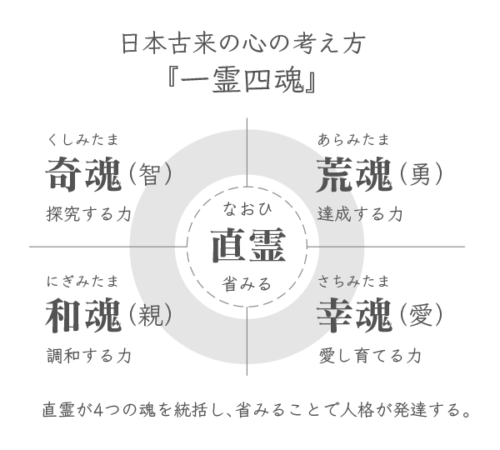
そして、これら四つの機能を統括するのが、省みる力を持った一霊「直霊」(なおひ)です。私たちは、自分がした行動や自分に浮かぶ考えや想いに対して、「こんなことをしたらダメ」「やりすぎだよ」「そんなことを考えたら良くない」「言わなきゃよかった」と、省みることがあります。つまり、自分の思いや行動をもう一人の自分が正しているのです。
さらに、この反省する力によって4つの魂それぞれを磨くことができ、人格が成長するという考え方が、日本古来の精神の構造、魂の構造なのです。この直霊は、人間の精神にとって最も大切な機能であり、認知心理学では「メタ認知」と呼ばれています。仏教では「観照者」、キリスト教では「プロビデンスの目」(全能の目)、古くはエジプトで「ホルスの目」、日本の室町時代には世阿弥によって「離見の見」と呼ばれたものに匹敵すると考えられます。
これは、私たち自身が日常で観察することにも合致しますよね。これが千数百年も前の日本で、既にできあがっていた世界観なのです。
How Japanese ancient wisdom captured the spiritual structure
The mind is made up of four souls and one spirit which governs them. Four souls are Ara-mitama (Courage), Nigi-mitama (Harmony), Sachi-mitama (Love), Kushi-mitama (Wisdom), and the spirit has the name of God called Naohi (Good will). The work of “Courage” is the power to advance, the work of “harmony” is to harmonize people, the work of “Love” is the power to love and to bring people up, and the work of “Wisdom” is to explore the truth or beauty. As depicted in the figure, we think that the strength of each soul differs depending on the person, and that individuality (personality) is made by that combination.
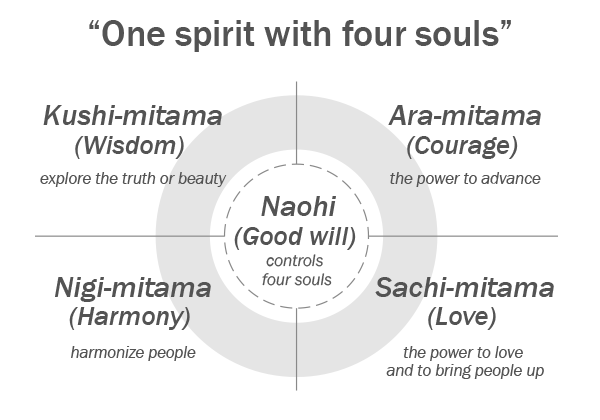
And, to supervise these four functions is “one spirit” (Naohi) that has the power to control those four souls. We do not want to say, “I do not want to do this”, “I do not want to do it”, “I do not want to think about it”, “I should not have said” in response to the actions that I did or the thoughts and thoughts floating on myself Yes. In other words, my own thoughts and actions are correct for myself.
Moreover, the idea that each of the four souls can be polished by this reflection power is a concept of an ancient Japanese spirit, the structure of the soul. This spirit is the most important function for human spirit and is called “meta cognition” in cognitive psychology. In Buddhism it was called “seeing person”, in Christianity “Providence eyes” (Almighty eyes), or in ancient Egypt “Horus’ eyes.” Those are comparable to “seeing of separation” called by Zeami in Japan Muromachi period.
The view of Zeami’s separation is not outside of me, but there is an outside eye in myself.
This is also consistent with what we observe in a daily basis. This Japanese concept has been completed as a human view back to more than six hundred years ago.
最先端の心理学と一霊四魂
最先端の心理学でも常に、心の構造を解き明かそうという科学的な研究がなされています。その中でも代表的なパーソナリティ理論である、米国のゴールドバーグ博士による「BIG FIVE THEORY;5因子論」では、人の性格は、外向性、親和性、感情的安定性、知性、良心(誠実性)という5つの性格特性から成りたっているといわれています。
これが、5因子論の概念図です。
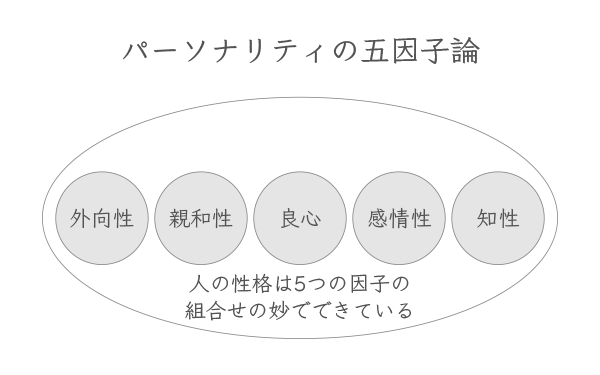
その特性である「外向性」とは、前向きに物事を進めること、「親和性」は人と親しみ調和を保つこと、「感情的安定性」は感情の豊かさ、「知性」は好奇心や分析力を現わします。「良心」は、誠実性や道徳性です。これら5つの特性が組み合わさり、人それぞれ、5つの特性のバランスが違うことによって、個性ができているというのです。
一方、一霊四魂の考え方では、勇、親、愛、智の4つの機能を備え、人によってそれぞれの強弱が異なっています。 4つの魂は、直霊の省みる機能で磨かれ発達するという考え方が、日本古来の魂の構造です。
このように、パーソナリティの最先端の考え方である5因子論と、一霊四魂の5つの因子は極めて似ています。では、この二つには、どのような共通点と相違点があるのか、ここで整理しておきましょう。それが日本古来の魂の考え方を実社会で応用するのに極めて大切だからです。
State-of-the-art psychology and "one spirit with four souls"
Even in state-of-the-art psychology, scientific research is constantly being conducted to unravel the structure of the mind. In “BIG FIVE THEORY” by Dr. Goldberg of the United States, which is a representative personality theory among them, the person’s personality consists of five characters such as extroversion, affinity, emotional stability, intelligence, conscience (integrity).
This is the conceptual diagram of the five-factor theory.
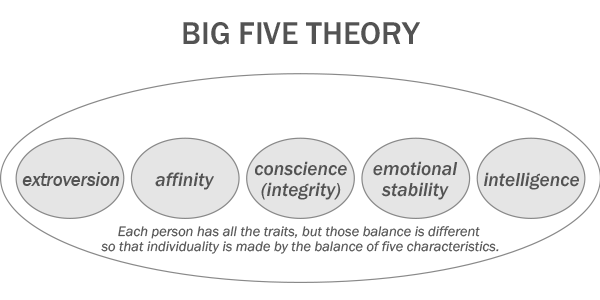
A factor of “externality” means to positively advance things, “affinity” to keep familiar with people for maintaining harmony, “emotional stability” to emotional abundance, “intelligence” to curiosity and analytical power. “Conscience” is honesty and morality. Each person has all the traits, but those balance is different so that individuality is made by the balance of five characteristics.
On the other hand, in the concept of one spirit with four souls, each person has four functions of Courage, Harmony, Love, and Wisdom and their strengths are different depending on the person. But those four souls are controlled, polished, and developed with the feedback by one spirit called “Naohi”, that is a ancient Japanese structure of the mind.
The five-factor theory of the personality’s most advanced thinking and the five factors of the one spirit with four souls are quite similar. Let’s keep in mind what kinds of common points and differences exist between these two theories. That is because it is extremely important to apply the concept of Japanese ancient spirit as technologies in real world.
五因子論との比較
①共通点
5因子論における5つの特性は、一霊四魂の5つの機能とかなり一致します。 現代心理学の代表的な5因子論の考え方は、最先端の科学的な方法で導き出された理論です。古来日本に存在した考え方が、最先端の科学理論とよく似ているのは大変興味深いではありませんか。
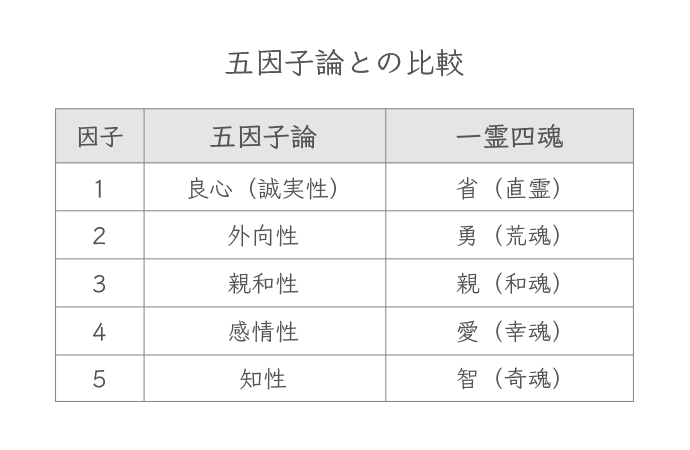
②相違点
一霊四魂の考え方は5因子論と表面は似ていますが、よく見比べると二つの質的な違いがあります。
(1)一霊四魂は人格の統合を説明できる
一霊四魂の考え方では、直霊が4つの機能をコントロールするということです。
一方、5因子論では、5つの特性が並列に分類されただけであり、どれかが特別な存在ということはないのです。この考え方では、5つの特性がどのように統合され、安定した人格が存在するのかを理論的に説明できないことになります。
なぜなら、5因子論は、辞書から性格を表わす形容詞を抜き出してきて、統計的にお互いに干渉し合わないグループがいくつあるかということをまとめたものであり、それらをコントロールする機能に関しては何も言っていないからです。
つまり、5因子論は一元論ですが、一霊四魂の考え方は、直霊が他の四機能をコントロールするという考え方なので、二元論といえます。これによって、人格がどう統合されているのかを説明できるのです。
(2)魂は発達し、その発達段階も提示できる
もう一つの違いは、性格は、発達するかしないかという点にあります。
5因子論には発達するという概念がありません。5因子の発現は、遺伝的なものだと考えられているからです。
つまり5因子論では、「性格は遺伝的に決定されていて変化しない」という前提があります。実際に、DNAの中に性格因子を探す研究が行われています。性格は生まれつきで変わらないもので、たとえ変わったとしてもそれは学習によるもので、別物なのだと考えているのです。
すると5因子論からは、その人の人格を磨こうという発想は出てきません。変化せず、人格は固定したものですから、そもそも磨くものではないわけです。
一方、一霊四魂の考え方では、「魂は豊かに成長する」ということです。「魂は磨くもの」「発達していくもの」と考えるのです。このような考えのなかからは、「魂が発達するのであれば、発達させようではないか」という発想が湧いてきます。しかも、その発達段階まで提供しているのです。
この2つの相違点は、人生への応用という視点からみると、重大なものとなります。 確かにパーソナリティを科学的に説明するには、5因子論が今もっとも最先端であるかもしれません。しかし、その五因子に対応する日本古来の一霊四魂の考え方があり、しかもそれは、私たちの人生をさらに豊かにしてくれる可能性を提供しているからです。
それは、魂(性格)因子は、コントロールでき、さらに、発達させることができるという発想をもたらしてくれるのです。 人間を科学的に研究している人たちは、私がそうであったように、「データはあるのか」「統計的な分析はしたのか」という疑問を持たれるかもしれません。もちろん実験的研究によってデータの蓄積は大変意味のあることですが、人間のパーソナリティは5つの特性(因子)から成り立っていることは十分なデータがあり、それは一霊四魂にも当てはめることができます。
要は、「発達するのか、そしてその発達過程は存在するのか」という一点が焦点になります。
いままで私たちの多くは、「性格は直らないもの」「修正できないもの」「三つ児の魂百まで」と考えてきました。
しかし、私たちは、これまで変わらないものとされてきた「性格」を、「魂」は磨かれ、豊かに発達するという視座から、実生活において、臨床的に検証していくことができるのです。
この磨くという過程で、自分や人の考えや想いがわかるようになり、人間関係に革命的な進化をもたらすことができると、私たちは確信しているのです。
Compare "One spirit with four souls" with "BIG FIVE THEORY"
1. Common points
The five characteristics of the five-factor theory are quite consistent with the five functions of the Japanese “one spirit with four souls. The idea of a represetative five-factor theory of modern psychology is a theory derived in a state-of-the-art scientific way. Is not it very interesting that the way of thinking that existed in Japan since ancient times closely resembles the state-of-the-art scientific theory?
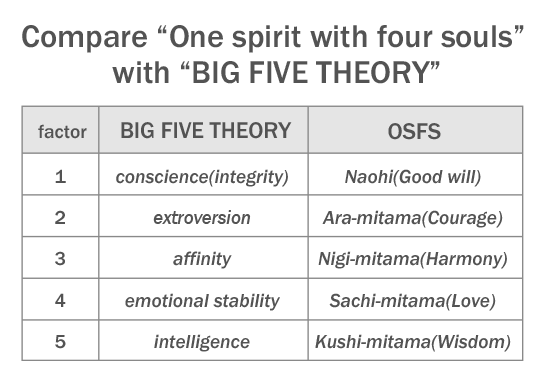
2. Differences
The idea of the “one spirit with four souls” is similar to the five-factor theory, but when you compare it well, there are two qualitative differences.
(1) The “one spirit with four souls” can explain the personality integration
In the “one spirit with four souls” way of thinking, it is that the spirit controls four functions.
On the other hand, in the five-factor theory, only five characteristics were classified in parallel, and none of them are special. This way of thinking cannot theoretically explain how five characteristics are integrated and a stable personality exists.
Because the five-factor theory summarizes how many groups do not statistically interfere with each other by extracting adjectives expressing personality from the dictionary but it has said nothing about the function of controlling them.
In other words, although the five-factor theory is monism, the idea of the one spirit with four souls is a dualism because the spirit is the idea that the spirit controls other four functions. This can explain how the personality is integrated.
(2) the soul develops and its developmental stage can also be presented
Another difference is that personality develops or not.
Five-factor theory does not have the concept of developing personality. Expression of five factors is considered to be genetic.
In other words, in the five-factor theory, there is a premise that “personality is genetically determined and does not change”. In fact, research to find personality factors in DNA is being carried out. Personality is born by nature and does not change, even if it changes, I think that it is learning, it is a different thing.
Then from the five-factor theory, there is no idea to polish that person’s personality. It does not change, because the personality is fixed, it is not a thing to polish in the first place.
On the other hand, in the idea of “one spirit with four souls”, “the soul grows abundantly”. I think that “the soul is something to brush” and “what develops”. From this idea, the idea of “If the soul develops, let’s develop it” will come up. Moreover, it is offering to the stage of its development.
These two differences are serious from the viewpoint of application to life. To be sure, to explain the personality scientifically, the five-factor theory may be the most cutting edge at the moment. However, there is a way of thinking of one ancient Japanese concept corresponding to those five factors, and that also provides the possibility of enriching our life.
It brings the idea that soul (personality) factors can be controlled and further developed. People who are scientifically researching humans may have the question of “Do you have data?” Or “Do you do statistical analysis” as I did? Of course, accumulation of data through experimental research is very meaningful, but there is enough data that human personality is made up of five characteristics (factors), which can also be applied to one spirit with four souls.
The point is “whether it develops and its developmental process exists”.
Most of us have thought that “Personality is not fixed”, “It cannot be modified”, “The child is father of the man”.
However, we can clinically verify the “personality” which has been considered unchanged so far from the viewpoint that “soul” is polished and develops abundantly in real life.
We are convinced that this process of polishing will enable us to understand our thoughts that are different each other and to bring revolutionary evolution to human relationships.
一霊四魂と古今の人間観・世界観
ゴールドバーグの5因子論は最先端の科学ですが、他にも一霊四魂と類似するフィロソフィーは世界各地の精神的伝統に見られます。
例えば儒教における四端、五徳(仁、義、礼、智、信)や、仏教における四天王(増長天、持国天、多聞天、広目天)に如来を加えたものに対応しています。
儒教の四端説は、やはり魂が磨かれていくことを前提としており、4つの特性を磨いていくことで聖人になれると考えているて点でも一霊四魂の考え方とあい通じるものがあります。
"One spirit with four souls" and an ancient world view of human beings
Goldberg’s five factors theory is a state-of-the-art science, but philosophies similar to one spirit with four souls can be found in the spiritual traditions around the world.
For example, it corresponds to the five edges in Confucianism, the five virtues (benevolence (仁), justice(義), courtesy(礼), wisdom(智), sincerity(信)).
In Buddhism there are the sun Buddha, called Vairocana, with Four Devas that are guardian angels , Jikokuten (Dhrtarastra), Zochoten (Virudhaka), Komokuten (Virupaksa) and Tamonten (Vaisravana) .
The four beginning of virtues theory by Confucian Mencius is based on the premise that the soul can be polished to become a saint by refining the four virtues, there is something that is in line with the idea of one spirit with four souls.
一霊四魂を詳しく見てみると
「一霊四魂」では、簡単に言うと、私たちの「心」は、四つの魂から成り立ち、それらを一つの「霊」がコントロールしていると捉えています。勇、親、愛、智という4つの魂の機能があり、それらを、直霊(なおひ)がコントロールしているという考え方です。簡単にまとめると、勇は、前に進む力です。親は、人と親しく交わる力、愛は、人を愛し育てる力、智は、物事を観察し分析する力です。
これら4つの働きを、直霊(なおひ)がフィードバックし、良心のような働きをするのです。例えば、智の働きが行き過ぎると、「あまり分析や評価ばかりしていると、人に嫌われるよ」という具合に反省を促すのです。つまり、この直霊は、「省みる」という機能を持っているのです。
「一霊四魂」とはどのような考え方なのか、さらに探求してみましょう。
勇 -荒魂(あらみたま)
四魂の1つには、荒魂「あらみたま」という神様の名前がついています。 「勇」は前に進む力です。勇猛に前に進むだけではなく、耐え忍びコツコツとやっていく力でもあります。その機能は、「勇」という一字で顕わされてきました。さらにこの「勇」は進、果、奮、勉、克という5つの機能に分かれます。これは先に述べた5因子論の「外向性」と対応します。
親 -和魂(にぎみたま)
2つめの魂には和魂「にぎみたま」という神様の名前がついています。親しみ交わるという力です。その機能は、一字で表現すれば「親」。これも5因子論の「親和性」に対応します。 その機能はさらに、平、修、斎、治、交の5つに分かれます。
愛 -幸魂(さちみたま)
3つめの魂には幸魂「さちみたま」という神様の名前がついています。人を愛し育てる力です。この機能は、「愛」という一字で表されます。愛で大切なものは、やはり感情です。幸魂が強い人は感情量が豊かな人です。5因子論の「感情的安定性」と類似の特性を捉えていると思います。 これは、さらに益、造、生、化、育の5つに機能が分かれます。
智 -奇魂(くしみたま)
4つめの魂には奇魂「くしみたま」という神様の名前がついています。これは、観察力、分析力、理解力などから構成される知性です。この機能は、「智」。なんと、これも5因子論の「知性」とあまりにも符合するではありませんか。 この機能は、さらに巧、感、察、覚、悟に分かれます。
このように、5因子論のうち、4つの因子は、日本の魂の4つの機能と酷似していることに、あなたも気づくと思います。では、「良心はどこにいったの」と思いませんか?それが、次にお話する5つめの機能なのです。
直霊のはたらき
省 -直霊(なおひ)
「直霊(なおひ)」とは、どのようなものなのでしょうか。直霊の機能を一字で表すと「省」で、自分の行動の良い悪いを、省みる(かえりみる)ということです。これは、5因子論の「良心」という特性に極めて近いと思います。
魂の内側にあり、もっとも純粋にして至善、至美の霊魂です。この直霊だけが、直接「天」につながっています。そして、天につながっていない四魂(勇親愛智)を統括していると考えます。あるいは、四魂のそれぞれの内に直霊があるとも考えてもよいでしょう。
直霊は、ものごとの善悪を判断して、人を誤らせないように導きます。もしも誤ってしまった場合は、それらを反省し、自らを責め、悔い改めます。 このように、直霊は、四つの魂を一段高いところから眺め、コントロールすることで四つの魂を磨くという働きをしています。これは現代心理学における重要な概念であるメタ認知といわれるものに匹敵します。
直霊は、天とつながっており、「天」の基準でフィードバックします。人と比べたら優れていることも、天から見ればまだ足らないと考えます。だから厳しい見方を自分自身にするのです。 つまり、常に直霊が天とつながっていて、正常に機能する限り、常に四魂をコントロールして磨いていってくれるわけです。
このように、日本古来の魂は、前述した四つの魂の組み合わせ、つまり心の四つの機能から成り立っていて、これら四つの魂を直霊がコントロールしているのです。
Looking at one spirit with four souls in detail
In “one spirit with four souls”, in brief, our “mind” is made up of four soul functions, and one “spirit” controls them. To summarize briefly, Courage is a force to move forward. Harmony is the power to interact intimately with people, love is the power to love and nurture livings, and Wisdom is the ability to observe and analyze things.
One spirit that works like a conscience gives feedback to these four souls. When the work of Wisdom goes too far, the spirit urges you to reflect on it. For example, “If you analyze or evaluate people, people will hate you.” In other words, this spirit has the function of “look away”.
Let’s explore further what kind of thinking is “one spirit with four souls”.
Courage – “Ara-mitama” Soul
One of the four souls is named “Ara-mitama”. Its function is “Courage” which is the energy to move forward. It is not only to go forward to battle but also to force with difficulty. Its function has been manifested in a single word “Courage”. In addition, this “Courage” is divided into five sub-functions, advance, fruitful, excite, strive, and overcome. This corresponds to the “extroversion” of the five factors theory mentioned earlier.
Harmony – “Nigi-mitama” soul
The second soul has the name of “Nigi-mitama”. Its function is “Harmony” This also corresponds to the “affinity” of the five factors theory. Its function is further divided into five categories: flatten, train, worship, rule, intersect.
Love – “Sachi-mitama or Saki-mitama” soul
The third soul has been called “Sachi-mitama”. Its function is represented by a letter “Love” composed of loving, giving birth and creating. What is important in love is still emotion. A person with “Love” is the one rich in feeling amount. It captures similar characteristics to “emotional stability” of the five factors theory. This has a further function divided into five of profit, construct, live, converse, and grow.
Wisdom – “Kushi-mitama” soul
The fourth soul is named “Kushi-mitama”. This is “Wisdom” composed of observational power, analytical skills, comprehension ability, etc. How, too, does not it coincide too much with the “intellect” of the five factors theory? This function is further divided into skillful, sense, observe, aware, and enlighten.
As you can see, the four factors out of the five factors theory closely resemble the four functions of the Japanese four souls. Then, do not you think that “Where did the conscience go?” That is the 5th feature we will talk about next.
直霊は実際にはどのようにはたらくのか
直霊は、四魂(勇親愛智)に、フィードバックを与えることで、コントロールしています。では、どのようにフィードバックするのでしょうか。
この図を見てください。
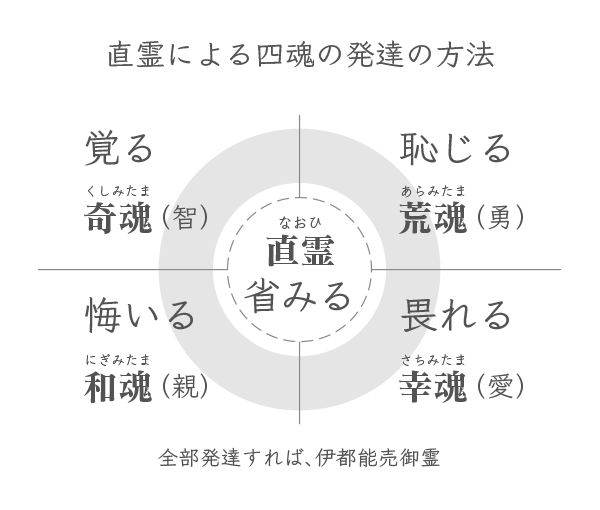
①荒魂(勇)には「恥じる」で
「勇」の力ですから、前にどんどん進んでいきます。もしも荒魂が「勇」の力でがむしゃらに進んでいってしまうときは、直霊が良心の働きをしてコントロールします。
直霊は、荒魂に対しては、「あなたは前に出すぎですよ!」「でしゃばったら、いけませんよ」とフィードバックします。このときは、「恥じる」ということでフィードバックするのです。「恥ずかしく思いなさいよ、そんなにでしゃばって」ということです。
あるいは反対に、「もっともっと行動しなさいよ」と後押しすることもあるでしょう。 直霊は「勇」に対して、このように働いてくれるわけです。
②和魂(親)には「悔いる」で
「親」の力とは、親しみ交わることで、平和や調和を求めます。したがって、場を乱さないように動きます。それに対して、直霊はときによっては、「人と仲良くするのはいいけれど、妥協しすぎですよ」「波風を立たないようばかりしていたら、進歩がないですよ」というように、フィードバックし、和魂を鍛え磨いてくれるのです。
和魂に対しては「悔いる」ということでフィードバックします。「なぜこんなことをしたのだろう」というふうに、悔いることをさせるわけです。
③幸魂(愛)には 「畏れる」で
「愛」は、人を受け入れ、許し、育て、何かしてあげようという力ですから、それがゆがんだ形で現れれば、あなたは人が自分でできることもやってしまったり、おせっかいになったり、ひいきの引き倒しになったりする場合があります。あるいは愛するあまり、道ならぬ恋に陥ったりする。そんなときには、直霊は幸魂に対しては、「そんなに子どもを溺愛したら駄目ですよ」「妻子がいるのですよ」「感情的にならずに冷静に」というようなフィードバックをします。
このときは、「畏れる」(おそれる)ということでフィードバックします。天を畏れさせるわけです。たとえば、盲目的に愛情に走りそうになったときに、あたかも「天を畏れなさい」というような「良心の痛み」を与えることになるのです。幸魂の暴走をコントロールし、磨いていくのです。
④奇魂(智)には「覚る」で
「智」は、物事を観察し、分析し、工夫するという力です。また、物事を深く探求し悟ろうとします。したがって、自分の基準によって、人や物事を厳しく見てしまいます。ですから、直霊は奇魂に対しては、「智に働けば角が立ちますよ」ということをフィードバックしてくれます。
このときは、「悟る」ということでフィードバックします。たとえば、これまで自分が正しいと思ってきたことでも、新しい別の事実や分析が出てくれば、素直に「自分は間違っていた」と悟らせてくれるのです。
このように四魂の行動に対してフィードバックし、それぞれを磨いてくれるのが、直霊の働きです。つまり、直霊は5因子論で「良心」と呼んでいるものに対応し、「省みる」という意味で「省」という字を当てはめられてきました。これは五情の戒律と呼ばれてきました。 このように、直霊が、四魂をフィードバックし磨くことで、魂を発達させるというのが、日本の伝統的な魂に対する考え方なのです。これは一霊四魂と呼ばれ、ひっそりと神社など神道において継承されてきているのです。
Working with the Divine Spirit
Good Will(Divine Spirit) – ”Naohi” spirit
The fifth factor is a navigator called “Naohi” spirit which controls the four souls. Its function is meta-cognition that examine oneself through giving feedback to one’s thinking or behavior. This seemed to be very close to the “conscience” of the five factors theory.
The way of being is the purest, the best, and the most beautiful. Only this spirit is directly connected to the “Supreme Being”. And the Divine Spirit supervises the four souls.
The Spirit guides the good and evil of things and guides them not to mistake others. If they are wrong, the spirit examines them, reproach themselves and repent. In this way, the spirit works to look at the four souls from a higher place and guide them to control the four souls. This is comparable to what is said to be meta-cognition, an important concept in modern psychology.
The Spirit is connected to the Supreme Being, and gives feedback on the highest standard. Anything is not enough if it is seen from the standard. That’s why we make a tough viewpoint ourselves. In other words, as long as the Spirit is always connected to the Supreme Being, as long as it functions properly, it always controls and polishes the four souls.
In this way, the ancient Japanese structure of the spirit is made up of the above-mentioned four soul combinations that are controlled by the spirit “Naohi”.
How does the Divine Spirit actually work?
The Spirit “Naohi” controls by giving feedback to the four souls (Courage, Harmony, Love, and Wisdom). So, how does the spirit give feedback to them?
Please look at this figure.
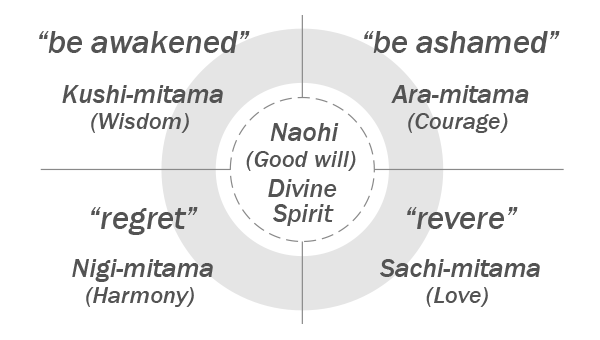
1. “To be ashamed” for Courage
Because it is the power of “Courage”, You may push others away and try to go forward. At that time, the Spirit may act as a conscience and control.
To the Courage soul, the spirit may say, “You do too much. Don’t do it! You should be ashamed of it”. In this way, the spirit will give feedback with “being ashamed”.
Or on the contrary, there may be a case that you do too little. The Spirit may say, “Please act more and more”.
2. “To regret” to Harmony
The power of “Harmony” asks for peace and harmony by interacting with familiarity. Therefore, it moves so as not to disturb the field. On the other hand, the Spirit sometimes say, “It is nice to get along with people, but it is too compromising” or “If you are just trying not to make a wave wind, there is no progress”.
For the Harmony soul, the Spirit will give feedback with “regret”, saying “Why did you do this?” In this way, the Spirit will polish the soul of Harmony.
3. “To revere” to Love
“Love” is the power of accepting, forgiving, raising, and doing something for others. If it appears in a distorted form, you may be drowning a child and you will do what the child should do. You may cheat with someone who is married. Or You may get angry with him tremendously, thinking that he hurt your heart. In such cases, the spirit gives feedback such as “If you drown in your child, you will make his personality useless.”, “He has a wife and children”, “Calm down without being emotional”.
In these cases, the Spirit will give feedback to the Love soul with “reverence” to the Supreme Being. The Spirit controls and polish the Love soul by giving a “conscience pain”.
4. “To be awakened” to Wisdom
The “Wisdom” soul is the ability to observe, analyze and devise things. Also, the soul will explore things deeply and try to understand. Therefore, you with Wisdom may evaluate people and things too strictly on your standards. So, the Spirit may give feedback to you, saying “Approach everything rationally, and you become harsh”.
To Wisdom, the Spirit will give feedback by saying “understanding”. For example, if another new fact or analysis comes out even for what you have thought right before, it will obviously make you realize “I was wrong”.
In this way, it is the work of the Spirit that feeds back on the actions of the four souls and polishes them. In other words, the Devine Spirit corresponds to what is called “conscience” in the five factors theory. This has been called the precepts of five factors. In this way, it is the way of thinking for Japanese traditional mind that the Spirit develops and polishes the four souls through giving feedback. This is called “One spirit with Four souls”, and it is secretly being inherited in Shintoism.
曲霊(まがひ)の存在
直霊が正常に働いているときは、四魂は磨かれていきますが、正常に働かなくなるとき、直霊は、曲霊(まがひ)になってしまいます。 曲霊によって、荒魂は争いばかりをする争魂となり、和魂は少数の仲間と悪だくみをする悪魂となり、幸魂は道徳的に退廃いした逆魂、奇魂は思想的に歪んだ狂魂となるのです。
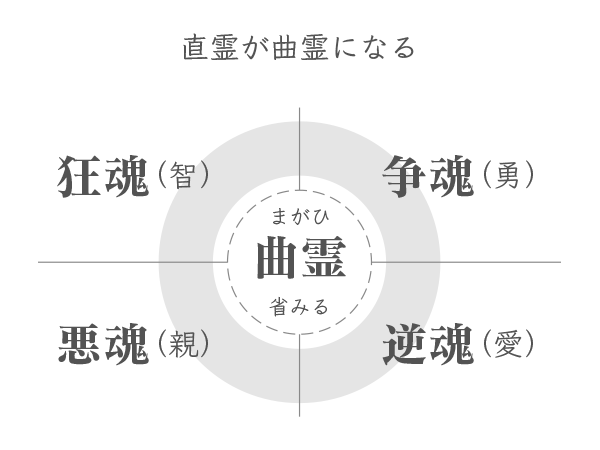
私たちは常に多かれ少なかれ曲霊にさらされているので、身辺を潔斎し正しい祈りをすることが大切です。この曲霊は善の仮面をかぶってやってきます。自分の内なる声に「自分が正しい」とか「自分はもっと評価されるべきだ」が出てきたら注意が必要です。
Presence of "Magahi" spirit
When the spirit is working normally, the four souls are polished. But when the spirit stops working normally, it becomes a evil spirit (Magahi). By the Magahi spirit, the Courage becomes a soul of fighting only “So-Kon”, the Harmony becomes a soul “Aku-Kon” that makes evil with a few colleagues, the Love becomes “Gyaku-Kon” that is a morally degenerate soul, and Wisdom becomes the evil soul “Kyo-Kon” which distortes ideologically.
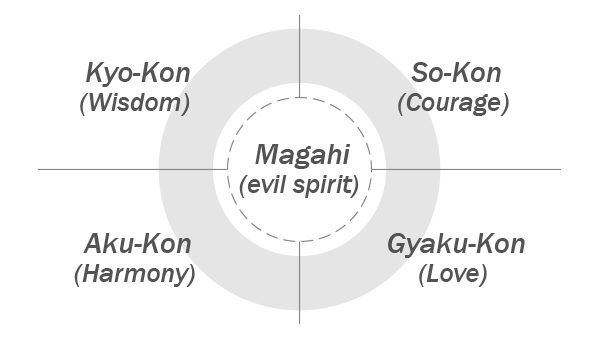
Since we are always exposed to the Magahi spirit more or less, it is important to purify ourselves and make correct pray. This evil spirit comes with a mask of good. Care must be exercised, when you think “I am right” or “I should be evaluated more” that appears in your inner voice.
四魂は磨かれ全徳を目指す
四魂は直霊によって磨かれることで、四段階で成長していきます。その段階とは何でしょうか。一つずつ見ていきましょう。あなたの成長の道しるべとなるかもしれません。
第一段階「一徳」
四魂のうち一つの魂が十分に発達した状態を「一徳」といい、一つだけ発達しても天国に行けると言われています。
第二段階「二徳」
二つの魂が十分に発達した状態を「二徳」といい、一徳の次は二徳を目指すことになります。二徳の組合せは、1.勇親、2.愛智、3.勇愛、4.勇智、5.愛親、6.親智で、合計6通り、それぞれ逆の組合せもあるので、厳密にいえば12通りあることになります。
四魂のうち、荒・和の二魂を経(たて)の魂といい、幸・奇の二魂を緯(よこ)の魂と呼ばれてきました。荒・和二魂が主となり、幸・奇二魂が従となっている魂を「厳霊」(いづみたま)と言い、幸・奇二魂が主となり、荒・和二魂が従となっている魂を「瑞霊」(みづみたま)と言います。人間の霊系には、厳霊的な人と、瑞魂的な人に分かれるともいわれています。
第三段階「三徳」
3つの魂が十分に発達した状態を『三徳』といい、勇智愛、勇親愛、勇親智、親智愛の4つの組合せがあります。
第四段階「全徳」
4つの魂全てが十分に発達した状態が「全徳」で、この全徳を備えた魂に対して、伊都能売御霊(いづのめのみたま)という神様の名前がついています。人間はこの全徳をめざして魂を磨いていくことが目的であるとされています。
このように、魂の発達に段階と方向性があります。人間は全徳を目指して四魂を磨いていくものであり、その過程が人生であると考えられてきたのです。この魂の構造とその発達段階は、日本書記以来の千数百年にわたって進化してきた壮大な体系で、現代の西欧のパーソナリティ理論を超えて、人間の崇高さへの深い愛情に根ざしていると思われます。
Four spirits are polished and aim for total virtue
Four souls grow in four stages through the process of being polished by the Naohi spirit. What are these stages? Let’s look one by one. It may be a sign of your growth.
First stage “One Virtue”
The condition that one soul of the four souls has developed sufficiently is called “one virtue”, and it is said that even one development can go to heaven.
Second stage “Two Virtues”
The state in which the two souls are sufficiently developed is called “two virtues”, and next to the virtue, we will aim for two virtues. The combination of two virtues is 1. Courage-Harmony, 2. Love-Wisdom, 3. Courage-Love, 4. Courage-Wisdom, 5. Love-Harmony, 6. Wisdom-Harmony. In total, there are 6 combinations, each of which has a reverse combination, so there are 12 combinations.
Of the four souls, the combination of two souls of Courage and Harmony functions as the spirit of the warpath. The combination of Love and Wisdom functions as the spirit of weft. When the Courage-Harmony combination fully developed and becomes the Lord and the Love-Wisdom combination is the subordinate, it is called “Izu Spirit”. When the combination of Love-Wisdom sufficiently evolved is the Lord, it is called “Mizu Spirit”. It is said that human spiritual system is divided into the Izu Spirit person and the Mizu Spirit person.
Third stage “Three Virtue”
The state where the three souls have been sufficiently developed is called “three virtue”. There are four combinations of Courage-Wisdom-Love, Courage-Harmony-Love, Courage-Harmony-Wisdom, and Harmony-Wisdom-Love.
Fourth stage “Total Virtue”
The state in which all four souls have been sufficiently developed is “total virtue”, and the soul with this total virtue is given the name of God called the Super Spirit (Izunome no mitama). It is said that human beings aim to polish the spirit aiming at this whole virtue. The stage of total virtue seems to be called “enlightenment” or “emptiness” in Buddhism and is a “saint” in Christianity.
Thus, there is a stage and direction in the development of the soul. Human beings are going to polish all four souls aiming at all virtues, and the process has been thought of as life. The structure and developmental stage of this soul is a grand system that has evolved over one thousand three hundred years since the names of one spirit with four souls appeared in “Nihon-shoki” (old chronicles of Japan). It seems that this system is rooted in deep love for human sublime beyond modern Western European personality theory.
参考文献
- 「本田親徳全集」(1976年) 本田親徳 (著) 鈴木重道 (編集) 山雅房
- 「霊界物語」出口王仁三郎(著)全81巻83冊 天声社
- 「人の心が手に取るように見えてくる」(2007年)出口光著 中経出版
- 「聴き方革命」(2008年)出口光著 徳間書店
- 「一霊四魂と和の精神」(2013)出口光著 サムライ出版
